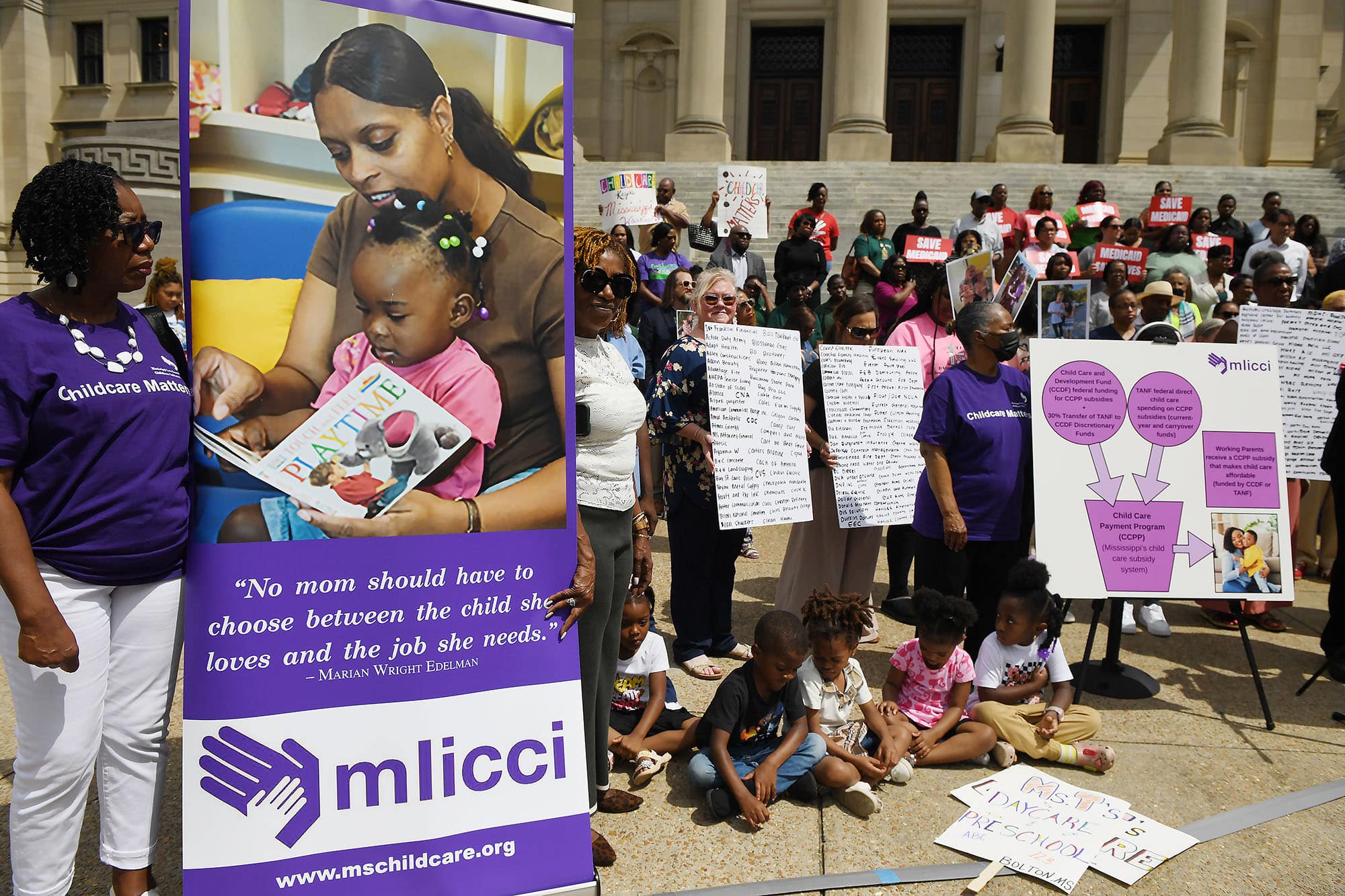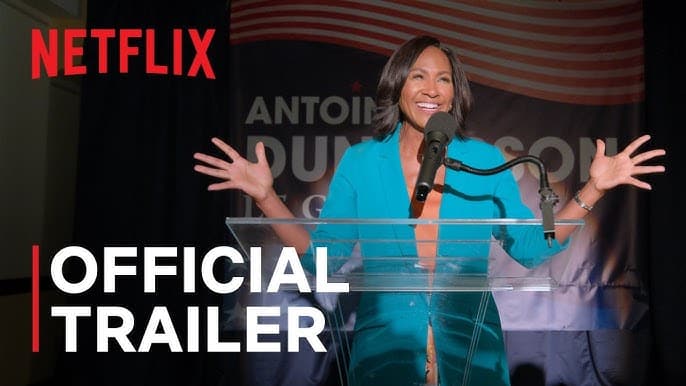Mississippi Today
Mississippi welfare funds wound up in a Ghanaian gold bar hoax, court filing alleges


Mississippi welfare officials for years directed federal funds intended to serve the state’s poorest residents to suspicious causes such as a university volleyball stadium, drug rehab for a former pro wrestler, a horse ranch for a former pro football player, and dozens of other things auditors have since flagged.
Text messages obtained by Mississippi Today and a new court filing reveal that the state’s welfare funds may have been lost in another stunning plot: an African heiress gold bar scam.
For the majority of 2019, the federal welfare funds quietly flowed to a pharmaceutical startup with questionable financial prospects. The payments are one component of civil litigation the state is bringing against dozens of people or companies that misspent or improperly received welfare funds.
A pleading filed Dec. 12 in the lawsuit alleges that the company’s founder, a defendant in the case, turned around and sent at least some of that money to an investment group in Ghana, Africa, for a venture that he thought would make him rich but turned out to be a scam.
The founder estimates he lost no more than $30,000 in company funds during a time when the company was primarily funded by a welfare grant, though it’s unclear how much of that amount may have originated from the federal funds. At that time, it would have taken a family of three 15 years to receive that much through the welfare program — a monthly check of $170 — which would have been impossible because the assistance maxes out after five years.
A defense attorney for another defendant recounted painstaking details of the hoax in his lengthy court filing, which alleges former Gov. Phil Bryant was behind the welfare department’s spending, including the intertwining of a drug manufacturing project with a federally-funded anti-poverty initiative. Bryant has repeatedly denied directing any of the welfare spending in question.
Jake Vanlandingham, a neuroscientist from Florida, founded a pharmaceutical startup called Prevacus in 2012 with the idea of developing a drug to treat concussions. To build up the company, he brought on former NFL quarterback Brett Favre, who himself suffered from concussions and used his platform as a famous athlete to raise awareness about the issue.
Favre and Vanlandingham would later take the project to then-Gov. Bryant and then secure $2 million in welfare funds through an economic development partnership that Bryant has tried to distance himself from since arrests in early 2020.
But before all that, the scientist became involved with an inventor who appears to have led him into a movie-like investment scam.
According to texts obtained by Mississippi Today, Vanlandingham began consulting with a man named Don Martin around 2017 to find additional funding and investors for Prevacus. Martin was based in Columbus, Ohio, and had his own concussion-related “smart helmet” venture.
He told Vanlandingham he was working on a deal with an investor named Daniella who owned land in Africa worth hundreds of millions that she was trying to sell to the government. Martin, now 71, told Mississippi Today last week that he met the supposed investor, a wealthy heiress from Ghana, when she reached out to him on Facebook.
Simultaneously, Vanlandingham said he was working to secure patents in China, to which he said he owed hundreds of thousands of dollars.
Through 2018, Martin had promised to secure an investment of $1 million out of the Ghana deal for Prevacus. That prospect, however far-fetched, was enticing to Vanlandingham, who said he needed the money to leverage an additional $2 million from the U.S. Department of Defense.
But after months of stringing the scientist along, Martin finally told Vanlandingham he would have to first put up $25,000 to help pay for a “geological analysis” for the land that Martin said his overseas investor required.
Vanlandingham tried to find the money, but the scientist’s contacts had dried up and he was experiencing deep personal financial problems, according to the texts. He was forced to sell his family’s home to pay the taxes for Prevacus, he said, and ask his mom for a loan to get into a rental. Martin tried to put him at ease by saying things like, “I know what we are doing is pleasing to God.”
Vanlandingham tried to get Favre to secure the $25,000 through an investment in Prevacus from one of his fellow professional athletes, but they wouldn’t bite.
Then Favre suggested they ask the then-Mississippi governor for help and offer him stock in the company. Bryant bit. The men met with several others for dinner in Jackson at Walker’s Drive-In in late December of 2018.
Days later on Jan. 2, 2019, the scientist and Favre met with then-welfare agency director John Davis and nonprofit operator Nancy New. There, they struck a deal — which Bryant denies facilitating — to push $1.7 million in federal welfare grant funds to Prevacus.
“Davis conferred with Bryant concerning using MDHS grant funds to benefit Prevacus,” alleges the court document filed Dec. 12 on behalf of New’s nonprofit Mississippi Community Education Center. “Bryant, Davis, and other MDHS Executives directed, approved, facilitated, and furthered the use of MDHS grant funds … to benefit Prevacus.”
Bryant, who is suing Mississippi Today for defamation and has sent threats to the news outlet for continuing to report this story, declined through an attorney to answer questions about this story or respond to allegations in the latest court filing.
The concept was for Prevacus to locate its clinical trial site and eventually the drug manufacturing plant at Tradition, a real estate development and medical corridor on the Mississippi Gulf Coast. Bryant would later become vice president of the venture, and the developer, Joe Canizaro, said he paid Bryant on retainer for consulting services for years after he left office.
The grant money for Prevacus didn’t come through instantaneously. “Is the grant submitted now? Have you been pre-approved? Are you confident funds will be within 48 hours?” Martin texted anxiously. “I need to update the attorneys.”
Vanlandingham assured Martin he’d secured the grant from Mississippi and the money was on its way. Martin said he was at peace “Knowing all is good and the communication with the grant lady is specific to distribution date.”
Vanlandingham had held Martin off for months as the hopeful inventor badgered Vanlandingham for some portion of the $25,000. But once Prevacus’ first payment of $750,000 in Mississippi welfare money came in mid-January 2019, Vanlandingham almost immediately wired an unspecified amount to Martin’s company ACTEX, texts show. “Wire sent your way. Make us proud,” Vanlandingham texted Martin on Jan. 23, 2019.
Vanlandingham texted another public official, Leonard Bentz, the director of South Mississippi Planning & Development District, formerly an elected public service commissioner for the southern district, who was at the meeting with Bryant in December.
“Hey brother lots of good stuff happening for us. 1.95M with the Governors help. We are excited. Good time to get investors!!!” Vanlandingham wrote in a never-before-published text. Bentz did not respond to this text. While he initially expressed enthusiasm about potentially finding funding for Prevacus at the Mississippi Development Authority, it wasn’t too long until Bentz stopped responding to Vanladingham altogether. Bentz said he was unaware welfare agency grant funds were used on the venture.
“I don’t think the governor and them have as much involvement as everybody’s making it out to be,” Bentz told Mississippi Today last week. “It is what it is, if those people who were managing those funds didn’t do right, then it sounds like the criminal justice system is going to get them for not doing right.”
Bentz added that if the concussion drug, which Prevacus has since sold to another company, ends up being legitimate, he still wants the manufacturing facility located in Mississippi. “Tell them we’d love to sit down with them,” he said.
For two weeks after Vanlandingham sent the funds to Martin, nothing happened until Martin explained “there is serious political unrest” in Ghana where his contact was located. He told Vanlandingham that Daniella was unsafe because there had been a rash of kidnappings of wealthy people in her region. Martin often discussed the plan to fly the wealthy heiress to the states, though he denied to Mississippi Today ever having a romantic relationship with the woman.
“The plan is first focus to get her to me safe,” Martin texted.
A week or so later, Martin broke the news to Vanlandingham that Ghana Vice President Mahamudu Bawumia had been in a serious car accident that killed his driver — a story news outlets widely reported but was later debunked. Another two weeks later, Martin said Daniella was in critical condition with malaria and depression. “They say she may not make it,” Martin said.
Vanlandingham sent another wire. “Bless you Jake! Daniella is better thanks to your thoughtfulness,” Martin responded. A month later, Martin asked for another $500, because “the government did not accept” the initial payment.
“This is it for me,” Vanlandingham responded. “I’m worried shitless this is a scam. I have until April 9th to pay 300k to China.”
By mid-April, Vanlandingham was saying, “I’m dead man … I owe 336k a week ago.”
But Martin had good news: their multi-million dollar payment was approved and ready to process, they just needed “a legal permit to the holding bank” which the government required “to meet compliance on source of monies.”
They were just short $4,000. The same day, April 18, 2019, New’s nonprofit sent Prevacus another $500,000.
The texts show Vanlandingham sent Martin another wire the next day. “Money cleared,” Martin texted, and Vanlandingham responded, “I’m counting on u brother.”
When Favre asked Vanlandingham for an update on Prevacus’ finances, the scientist responded, “Not much still pushing the African money.”
Then the attorney on the ground in Ghana who they were allegedly working with to close the deal asked for a $1,000 stipend. Martin relayed his message: “Please try your best and get me the 1k to survive on I have no one here.”
In mid-May, Prevacus received another $250,000 in Mississippi grant funds. About a week later, Martin offered more good news: he could increase his investment in Prevacus to $1.5 million “if you can wire $5k to me today or pay to accelerate.” Vanlandingham sent another wire.
“Man I’m stoked. … It’s our time!!!” Vanlandingham texted. Then, after receiving no money four days later, “Yo, my brother. I’m dying!!!”
Around the same time, the court filing shows that Vanlandingham was updating Prevacus investors about “clinical patient intake site at Tradition,” telling them, “A great deal of this has been funded with the help of folks in Mississippi including the Governor.”
In early June, Martin again told Vanlandingham they needed more money to close. Daniella had found two more parcels that the government wanted to add to the real estate deal, but Vanlandingham would have to put up another $8,000 in closing costs.
“What if we don’t?” Vanlandingham asked. Martin responded, “Wow…if we don’t then according to the attorney the government can get ugly and take the land.”
A few days later, Vanlandingham said he secured another investor and sent another wire to Martin. “Make us proud brother,” he texted.
A couple weeks later, the story went that there was a hold up at the bank. While the attorney, who they called Steven, was trying to wire the money, “the Ghana Media Coalition against illegal small-scale mining came up to Steven seeing the wire was a great deal of money stopping to question him…holding him until yesterday.”
“A friend of the Minister and Steven’s is putting up $17k for attorneys fees to clear Steven and release the wire,” Martin said.
Vanlandingham responded, “This sounds positive at some level?”
Now, Martin said, they needed to find an additional $18,000 to release the hold.
Vanlandingham began researching what are called “4-1-9” fraud schemes and found an article on the website for the U.S. Embassy in Ghana describing a scenario eerily similar to what he was experiencing.
The website states, “The goal of the criminal is to delude the target into thinking that he is being drawn into a very lucrative, albeit questionable, arrangement.”
Vanlandingham texted Martin a link to the article, explaining that he’d been looking into this “fraud stuff” where “it’s always ‘urgent’ and there’s always just ‘one more’ payment.”
Martin, whom the Dec. 12 court filing described as “unflappable”, responded by acknowledging the existence of such schemes — “Yes – there is…Steven told me all about it” — but then appeared to try to distract from the issue by describing in detail an unrelated illegal mining operation.
“…especially regarding the Chinese national at the heart of illegal mining in Ghana, … Nicknamed as the “galamsey queen”, … who was arraigned in Ghana in 2017 for engaging in illegal small-scale mining at Bepotenten in the Amansie Central District in the Ashanti Region, was later deported in December 2018 by the government,” Martin wrote.
A few days later, Vanlandingham began talking about involving the FBI “if this gets hung up much longer.”
When he suggested this to the lawyer in Ghana, Vanlandingham received the response, “You can report to FBI like you said am not scared sir am not a criminal if us every thing is for real you will regret thinking other wise.”
But the scientist proceeded with them earnestly. “Worse still, Martin had begun proposing unusual transactions,” the court filing reads. “For example, Martin told Vanlandingham that ‘[w]hen Steven wires to Prevacus $2k, you will wire back the $2k to same source he sent from then you will wire me 4500 … and I will wire him 4500 – closing same day.’”
The deal was falling apart, but Martin said Daniella had a backup plan: “the gold bars her father gave her before he died she is trying to sell … she sent me a Video.”
“So to be clear as of now we are betting on selling gold bars for me just to get my money back?” Vanlandingham texted.
The same day, on July, 16, 2019, Favre texted Gov. Bryant about funding for another pharmaceutical product he said New had promised to support but had apparently dropped. “Hey Governor we are in a little bit of a crunch. … Jake can explain more but bottom line we need investors and need your direction.”
“Will get with Jake.. will help all I can,” Bryant responded.
Also the same day, Prevacus received another $400,000 in Mississippi welfare money. New had told Vanlandingham, “I will need to let Brett know that we will need to pull this from what we were hoping to help him with [volleyball]….”
That evening, Favre visited Bryant. On his way, Favre texted Bryant, “I really need your help with Nancy and Jake. I’ll be mowing your lawn for years after this!!”
“You my man… we are all in..” Bryant responded.
After seeing Favre that night, Bryant texted New, “Just left Brett Favre. Can we help him with his project. We should meet soon to see how I can make sure we keep your projects on course.”
Favre thanked Bryant and the governor responded that he had scheduled a meeting with New and arranged a call with the White House. “This can help with our concussion project,” the governor wrote.
The court filing points out, “Again, Bryant described Prevacus as ‘our … project.’”
The next day, Martin forwarded the video of the gold bars to Vanlandingham. In it, a man intentionally displays his hand with two large rings on his pinky and ring fingers as another man in a suit bends down to open a gray safe on the floor to reveal the bars.
Vanlandingham reviewed the video and responded, “You-Tube? FBI time?”
The attorney representing New’s nonprofit, who wrote the latest court filing, alleged that Vanlandingham communicated with Favre and Bryant about the Ghana situation.
“Based on information and belief, Vanlandingham spoke to Bryant concerning his investment in Ghana and its importance to Prevacus,” the filing reads.“Based on information and belief, the Prevacus funds that Vanlandingham invested in Ghana included grant funds from the State of Mississippi.”
“Good news,” Vanlandingham texted Martin on July 19, 2019. “I’m pretty good friends with the Governor and he has direct access to Stephanie Sullivan the US ambassador to Ghana. We can run communication through the Governor and get these thieves!!!!”
The latest court filing then highlights the fact that Bryant traveled to Ghana less than a month later in August 2019. Documents obtained by Mississippi Today show, however, that Bryant’s trip to Ghana and bordering Togo was planned beforehand and dealt with strengthening trade ties between Mississippi and West Africa.
“During his remarks, he (Bryant) said, a lot of investors based in Mississippi are interested in doing business in Ghana, the reason for which he is in the country to build an economic and investment bridge to facilitate future trade,” reads a press release from the American Chamber of Commerce-Ghana.
Bryant traveled to Ghana with the CEO of a south Mississippi-based product called Sparta Mosquito Eradicator to discuss selling the company’s product to the country to deal with malaria outbreaks. Vanlandingham’s attorney George Schmidt told Mississippi Today last week that Bryant did not travel to the country on behalf of Prevacus and that the timing of the trip was a coincidence.
While Bryant was in Ghana, though, he continued to consult Favre on how to secure funds from the state welfare agency for the construction of a volleyball stadium at University of Southern Mississippi — another project at the center of the scandal.
“Taking off from Ghana so this may be my last message for a while,” Bryant texted Favre Aug. 16, 2019.
Back in the states, Vanlandingham complained to Martin that, “You have put my (sic) in a fraudulent situation with my company … I gave u company money not returned on my books.”
But Vanlandingham continued to inquire on the sale of the gold bars until Martin finally told him they’d been confiscated. The scientist finally snapped, saying, “Wow. What a joke. You got played. I’ll do fbi myself brother. … Pitiful for me to have been involved … What makes me the most furious is u never raised money for Actex. It also makes me curious to your involvement.”
“U continued to take me down satans road,” Vanlandingham said.
Yet Vanlandingham still kept hoping for something to turn around. Two days later, he texted, “I’m pretty devastated please share any progress. I’m out 120k with nothing to show for it.”
Martin said Daniella reached out to a Greek investor who might be willing to put up the money to release the wire. “Wow!!!!” Vanlandingham responded. “Bring it home brother!!!”
Vanlandingham wired another $1,000, supposedly to match what the Greek investor planned to put up towards the closing costs. But then the heiress told Martin that the investor had backed out, and implored him to find the money himself. “If you really can please do honey because we are at the edge of closing,” Daniella said, according to a message Martin forwarded to Vanlandingham.
“So did I throw away another 1k?” Vanlandingham asked.
When Vanlandingham asked where the money went, Martin responded that “Daniella is tired and not well.”
This went on for several more months, despite Vanlaningham’s stated connections to authorities in Ghana. The game continued even after investigators from the State Auditor’s Office began questioning Vanlandingham as part of the Mississippi welfare scandal. After New and Davis were arrested in February of 2020 on embezzlement charges partially related to the Prevacus payments, Vanlandingham and Martin were still discussing traveling to Berlin to get $300,000 for the scientist out of the Bank of Ghana.
From the texts, it’s hard to discern if Martin, who was at least initially reluctant to alert the authorities, was complicit, or if he, too, was swindled. Asked for comment for the story, Vanlandingham said he would contact his counsel but said by text that “Dons a good guy with interesting technology.”
Vanlandingham’s lawyer, Schmidt, told Mississippi Today last week that his client’s payments to the Ghana deal totaled no more than $30,000. The lawyer said he was unaware those funds originated from the welfare program.
Martin told Mississippi Today by phone last week that he’d fallen for the scam and that he never received a dime from the Ghana investor group. He couldn’t say how much in total he’d received from Vanlandingham, all of which he said he sent to Ghana, and that also he didn’t know the money potentially originated from federal grant funds earmarked for Mississippians. But when Martin finally filed a police report, he estimated his total losses at $500,000.
An incident report Martin provided to Mississippi Today shows he reported the scam to the Powell Police Department in Ohio in May of 2022 and the local police department forwarded the case through the FBI to the authorities in Ghana. “I advised Mr. Martin that this was a known scam and he would not be likely to get his money back,” reads the officer’s report.
By the end, it had gotten worse. Martin said the Ghanaians had threatened to kidnap his daughter, and forced him to max out his credit cards purchasing products like laptops and iPhones for them. The police report shows that even after Martin initially reported the incident, the scammers told him there was a warrant for his arrest and convinced him to send $40,000 to remove the warrant. Martin said he’s in $140,000 worth of credit card debt. He also said he experienced a fire in 2021 and he’s been living in the dilapidated house, exposed to the elements with no heat or water.
“I’m totally broke,” Martin told Mississippi Today on Dec. 14.
Martin is still promoting his helmet invention and company, ACTEX, but he’s never raised the money to develop a prototype. He explained that the main reason he fell for the Ghana hoax, which went on for about three years, is his strong faith in God and the belief that he was created for a purpose.
“The way I looked at it was, God works in unusual ways. See, because ACTEX is dedicated for God’s kingdom. And it’s there to save lives and to help people. That’s part of my mission statement. So I kept thinking, ‘Well, okay.’ Because I prayed about it. (And God said), ‘Yes, this is what I want you to do.’ ‘Yes, yes, yes.’”
Martin still believes that he acted in obedience of the Lord and that “he’ll bless ACTEX and many doors will open.”
Meanwhile, the Mississippi welfare funds allegedly lost to the Ghanaians in the scam have yet to be recovered. New and her son have pleaded guilty to felonies for pushing welfare funds to Prevacus. Vanlandingham and Favre are facing civil charges. Bryant has not faced criminal or civil charges. The criminal investigation is ongoing.
This article first appeared on Mississippi Today and is republished here under a Creative Commons license.
Mississippi Today
Gov. vetoes bill providing hospitals ‘stability’

Gov. Tate Reeves vetoed a bill Thursday that would help stabilize hospitals, calling it the “Grady Twin” of a bill he vetoed in March.
Lawmakers made some changes to the previously vetoed legislation in a new bill, but kept much the same. Reeves cited many of his same concerns this time around, including alleged contradictions and the loom of a deficit.
The bill, authored by Senate Medicaid Chairman Kevin Blackwell, R-Southaven, sought to make several changes to the Medicaid program – from mandating providers screen mothers for postpartum depression to requiring the agency to cover a new sleep apnea device.
Blackwell did not respond to a request for comment by the time of publication.
Arguably the largest impact of Senate Bill 2386 would have been that it called for locking in place supplemental payment programs that have been a lifeline for hospitals – but which are unreliable as they vary from year to year, according to Richard Roberson, CEO of the Mississippi Hospital Association.
That fluctuation makes it difficult for hospitals to plan what services they can offer.
“The supplemental payment language was intended to offer better budget predictability as hospitals move through these uncertain times and instructed the Division (of Medicaid) to maximize federal funding,” Roberson said. “… Hospitals, like other businesses, need stability to continue to serve their communities effectively.”
Supplemental payment programs bring in around $1.5 billion federal dollars to Mississippi hospitals each year.
Reeves said in his veto statements for both bills that locking the payment program in place is in contradiction with another of the bill’s mandates, which would change the program to allow out-of-state hospitals that border Mississippi to participate in the program.
“It is logically nonsensical for Senate Bill 2386 to, on the one hand, freeze the MHAP, while on the other hand, mandate that the Division open the program to include an additional hospital.”
But Roberson said the language of the bill would not prohibit the programs from growing – it would merely clarify what hospitals need to do to get paid.
Reeves again said the bill “seeks to expand Medicaid.” The bill brings forth code sections related to eligibility requirements, but it doesn’t call for expanding the Medicaid population by increasing the income threshold, which is what is typically referred to as Medicaid expansion under the Affordable Care Act.
Thursday’s vetoed bill was hospitals’ last recourse for stabilizing their budgets via legislation.
Richardson says the Mississippi Hospital Association has now turned its sights toward the Division of Medicaid to secure hospitals’ payment programs without the help of the Legislature.
“With or without Senate Bill 2386, we are hopeful the Division will work to stabilize the model,” Roberson said.
This article first appeared on Mississippi Today and is republished here under a Creative Commons Attribution-NoDerivatives 4.0 International License.
Mississippi Today
Parents, providers urge use of unspent TANF for child care

Child care providers, parents, children, legislators and advocates gathered outside the state Capitol Thursday to call on Mississippi to use unspent welfare funds and resume accepting child care certificate applications.
Last month, the Mississippi Department of Human Services announced it will temporarily stop accepting new applications, redetermination applications and “add a child” applications for the child care certificate program for certain families as the result of the loss of COVID-19 relief funds. The hold, started March 31, will continue indefinitely. The program provides child care vouchers to eligible families, often with a co-payment fee.
MDHS explained that without the COVID-19 relief funding the number of families with child care certificates is more than it can support long term. When asked how long the hold would last, chief communications director Mark Jones explained the hold would end when the number of children with certificates dropped below 27,000 children and $12 million in monthly costs.
The week before the hold began, on March 28, 36,186 children had child care certificates. 25,300 of them fit into one of the MDHS’s priority categories. 10,800 did not.
The Mississippi Low-Income Child Care Initiative, Child Care Directors Network Alliance, Mississippi Delta Licensed Child Care Providers, and Mississippi Black Women’s Roundtable organized Thursday’s gathering and press conference to implore MDHS to tap into unused TANF funds to book the child care payment program.
“DHS has about $156 million in money from prior grant years that has gone unspent,” said Carol Burnett, MLICCI’s executive director, at the press conference.
The child care payment program gets funding from federal and state sources. It received $127 million from the Child Care Development Fund in fiscal year 2024, as well as $7 million in state appropriations, and $25.9 million transferred from the Temporary Assistance for Needy Families grant.
That $25.9 million is 30% of the state’s annual TANF grant money transferred into funds for child care certificates. It is the maximum amount they’re allowed to transfer under federal law. The state also spends 85% of its money from the child care development fund on certificates, when federal law requires them to use at least 70%.
MLICCI and others want MDHS to add to that by spending current and carryover TANF funds on child care subsidies for families that qualify for child care certificates. According to a memo MLICCI prepared, this method does not require legislative action, has no spending limit, and is already used by other states.
Under the current hold, families can apply and get their certificates renewed if they fall in one of the following six categories: on Temporary Assistance for Needy FamiliesTANF or transitioning off of TANF, homeless, with foster children, teen parents, deployed military, orand with special needs. The Division of Early Childhood Care & Development will continue paying for certificates for all families until their certificates expire.
In a statement, MDHS’ chief communications officer Mark Jones said “MDHS understands these concerns and reaffirms its commitment to support child care, transportation, education, and other needs of families who need to return or remain in the workforce. Our aim is to ensure our approaches are sustainable.”
Burnett, parent KyAsia Johnson, state Rep. Zakiya Summers, D-Jackson, and multiple child care providers talked about the toll the hold has taken on child care centers and families. They also stated the importance of child care to sustain the state’s workforce, keep child care providers afloat, and educate young children.
They also urged citizens to contact the state’s political leadership to get their attention.
“This decision is putting people like me in an impossible situation,” said Johnson, a child care provider and parent. “What am I supposed to do without child care?”
Each provider spoke about how they had to explain the hold to parents, many of whom have had to pull their children out of day care. Cantrell Keyes, director of Agape Christian Academy World in Jackson, had five families pull their children out of her center. “More than half of my school tuition comes from CCPP,” she said.

Rep. Summers called on MDHS to lift the hold on child care applications, use the extra TANF funds, and communicate better with parents and providers.
“Right now, thousands of Mississippi children might lose child care, not because the need has disappeared, but because the agency has made a choice,” she said.
The hold on child care certificates comes at a time when many child care providers and parents are struggling to stay afloat amid high costs, high turnover and high demand.
Deloris Suel, who owns Prep Company Tutorial Schools in Jackson, said, “Child care is in crisis. We’re not heading for crisis, we’re in crisis.”
This article first appeared on Mississippi Today and is republished here under a Creative Commons Attribution-NoDerivatives 4.0 International License.![]()
Mississippi Today
Tyler Perry comedy about a Mississippi lieutenant governor ‘She The People’ set to stream on Netflix

Netflix has announced it will stream “She The People,” a comedy written, produced and directed by Tyler Perry based on a fictional newly elected Mississippi Lieutenant Governor, Antoinette Dunkerson, played by Terri J. Vaughn.
According to a trailer released Thursday and press about the show, the new Lt. Gov. Dunkerson character realizes her new job will be extremely tough due to a sexist and condescending governor.
Executive producers for the show include Niya Palmer, Vaughn and former Atlanta Mayor Keisha Lance Bottoms. The cast also includes Tre Boyd, Dyon Brooks, Jade Nova, Jo Marie Payton and Drew Olivia Tillman.
The first eight-episode season debuts May 22 on Netflix, with a second eight-episode season premiering Aug. 14.
This article first appeared on Mississippi Today and is republished here under a Creative Commons Attribution-NoDerivatives 4.0 International License.
-

 News from the South - Florida News Feed5 days ago
News from the South - Florida News Feed5 days agoJim talks with Rep. Robert Andrade about his investigation into the Hope Florida Foundation
-

 News from the South - Alabama News Feed7 days ago
News from the South - Alabama News Feed7 days agoOp-Ed: Colleges shouldn’t need remedial algebra classes: Five K-8 policy solutions to address math proficiency | Maryland
-

 News from the South - Arkansas News Feed6 days ago
News from the South - Arkansas News Feed6 days agoValerie Storm Tracker
-

 News from the South - Virginia News Feed6 days ago
News from the South - Virginia News Feed6 days agoHighs in the upper 80s Saturday, backdoor cold front will cool us down a bit on Easter Sunday
-

 News from the South - Kentucky News Feed6 days ago
News from the South - Kentucky News Feed6 days agoU.S. Supreme Court pauses deportations under wartime law
-

 Local News7 days ago
Local News7 days agoEaster events happening across the coast
-

 Mississippi Today4 days ago
Mississippi Today4 days ago‘Trainwreck on the horizon’: The costly pains of Mississippi’s small water and sewer systems
-

 News from the South - Alabama News Feed4 days ago
News from the South - Alabama News Feed4 days agoPrayer Vigil Held for Ronald Dumas Jr., Family Continues to Pray for His Return | April 21, 2025 | N











































